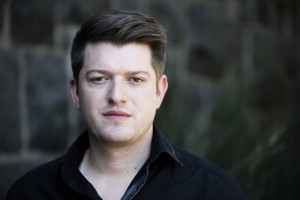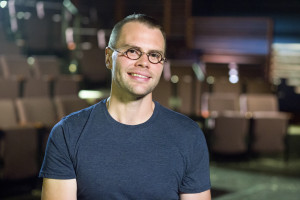Co-producer Brandon Woolley chatted with The Few playwright Samuel D. Hunter about inspiration, process, interstates and Idaho as rehearsals for CoHo’s upcoming production were just underway. Read the first and second parts of their conversation here and here and check back for more next week!


BRANDON:
Where you are in terms of your career. Heavily commissioned at this point, with two new plays Lewiston and Clarkston going on. But since the or prior to the MacArthur Genius grant, how many new plays do you have going on at once? It sounds like you are crazy busy.
SAM:
It varies. I’ve tried to slow down, I haven’t taken any commissions recently. It’s crazy, I want to slap myself for saying that, I’m in such a fortunate position that I can say no to commissions. But Lewiston and Clarkston really couldn’t be commissions, the very natures of these plays is that they are interrelated and in conversation with one another. I’m not sure if they want to be performed together, or in rep, or if they are two separate plays, so for those reasons I couldn’t write these as commissions. Which is a luxury, being able to do that. There were years right before the MacArthur happened, when I was feeling pressure to work and produce as much as I can. And during these years, as an experiment I gave up my day job as a teacher to be a full-time playwright, and I thought—okay, let’s see if I can make this work. And I did for two or three years, but it was nuts. I don’t know if I could do it again. I loved it and wouldn’t change anything about that time, but I think a person could only be a fulltime playwright for a few years before something has to give. I was travelling 275 days out of the year. Writing in the morning and going to rehearsal for a different play and writing in the evenings again. The nice thing about the MacArthur was it took away the pressure of having to make that awful math work, the math of figuring out how many productions you get in a certain year, how much you can potentially make off of each production, which is tied to reviews and house sizes and a lot of other annoying details. So having something land in your lap that is 5 years of financial support – I’ve never had that longevity before. Before that happened, I felt lucky if I could see six or seven months ahead of me. Also, this largess of time and support has made me realize that I have a life as well. A life that includes things like marriage and family, the big stuff that I don’t want to sell short.
BRANDON:
Do you think feeling more freedom in that regard informs the new plays you are writing? If it is, how so?
SAM:
Maybe I am letting the plays gestate more. I’m waiting until I’m chomping at the bit to write the play. Whereas before I perhaps felt like I should write the play the moment I had the idea. Sometimes that’s what you need to do, get out of your own way and write the thing. The play I’m working on now will slowly develop, rather than forcing myself to deliver as fast as I can. Also I’m getting into film and TV, probably 20% of my year, that’s been really great.
BRANDON:
Who are you writing for?
SAM:
This show on FX called Baskets, this crazy experimental comedy. It’s been really interesting flexing different muscles, learning about comedy. And we have complete artistic freedom, we get like zero notes from the network. I think because Louis CK is producing it. And it’s really helped my playwriting by widening my skillset, expanding my horizons a bit. It feels like the writing version of going to the gym.




